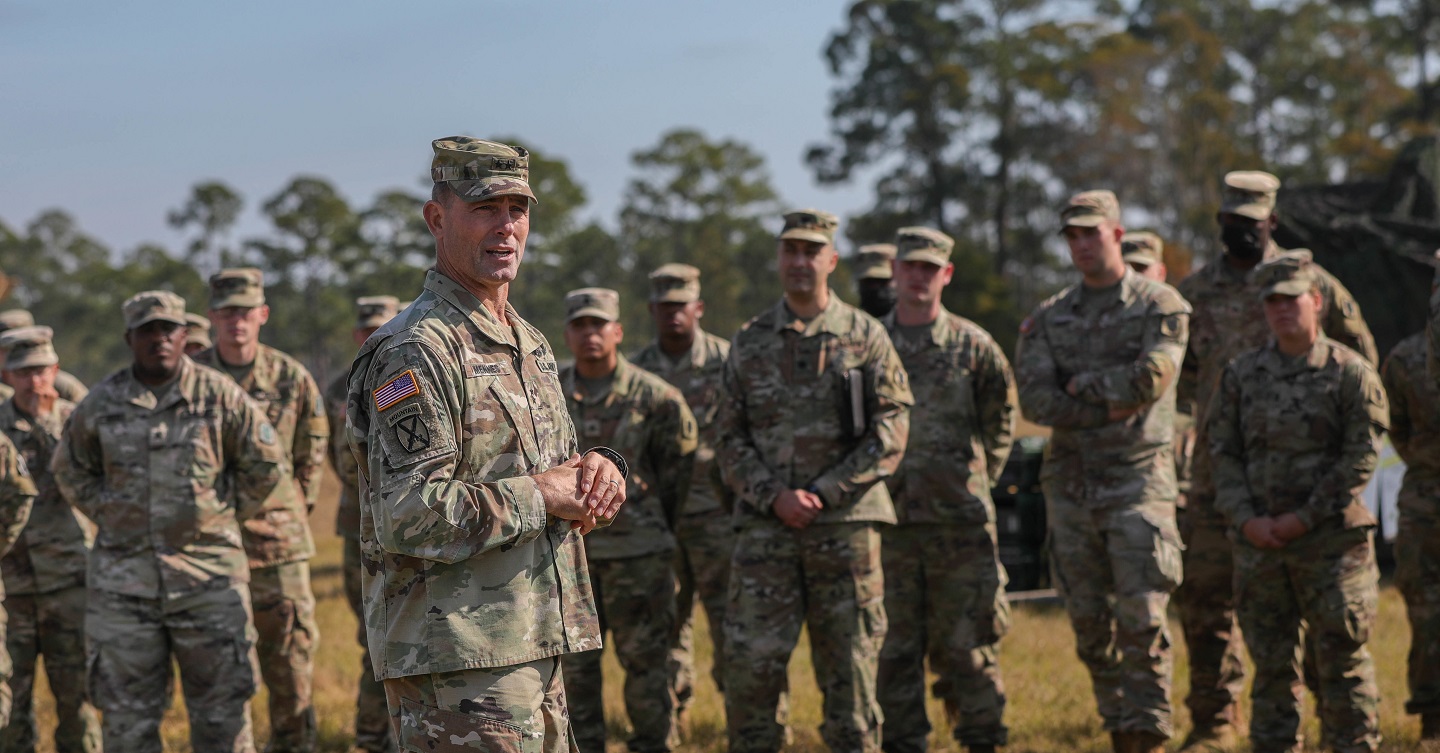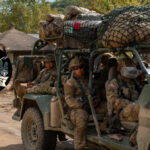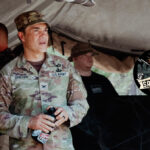
For many, Afghanistan and the lessons that should have been learned have been overshadowed recently by the invasion of Ukraine by Russia. And as much as Ukraine deserves the attention of the world, national security professionals have a duty to learn as much as possible from the successes and failures of Afghanistan. To that end, A BETTER PEACE is extremely pleased to welcome Maj Gen Brian Mennes, the Deputy Commanding General, XVIII Airborne Corps, Fort Bragg, North Carolina. He joins Tom Spahr in the virtual studio to discuss his experiences in Afghanistan during his multiple tours in the theater. Tom and the general served together on three separate tours in Afghanistan and their conversation focuses on the wins that they achieved along the way along with the losses and the eventual fall of the Afghan government in August 2021.
Clausewitz would say “General before you start this war be sure to understand the peace you hope to create.”
Podcast: Download
Subscribe: Apple Podcasts | Spotify | Amazon Music | Android | Pandora | iHeartRadio | Blubrry | Podchaser | Podcast Index | TuneIn | Deezer | Youtube Music | RSS | Subscribe to A Better Peace: The War Room Podcast
MG Brian Mennes is the Deputy Commanding General, XVIII Airborne Corps, Fort Bragg, North Carolina. He is the former Commanding General, 10th Mountain Division (Light Infantry) and Fort Drum, New York and Deputy Chief of Staff for Operations OPERATION FREEDOM’S SENTINEL, Afghanistan. He has served multiple tours in both Afghanistan and Iraq.
Tom Spahr is a Colonel in the U.S. Army and an Assistant Professor in the Department of Military Strategy Planning and Operations at the U.S. Army War College. He holds a PhD in History from The Ohio State University. He completed his most recent twelve-month tour in the Resolute Support Headquarters, Afghanistan in July 2020.
The views expressed in this presentation are those of the speakers and do not necessarily reflect those of the U.S. Army War College, U.S. Army, or Department of Defense.
Photo Description: U.S. Army Maj. Gen. Brian Mennes, the Deputy Commanding General of the XVIII Airborne Corps, pays a visit to the 35th Signal Brigade on Nov. 3, 2021, at Ft. Stewart, Ga.
Photo Credit: Spc. Maxine Baen





From our podcast above: “Clausewitz would say: ‘General before you start this war be sure to understand the peace you hope to create.’ ”
Let me modify this somewhat, to suggest that the following might be (a) a better way to (b) ask a better question. Here goes: Clausewitz (as the Supreme Military Officer) might say the following to the political leadership of the country that he was advising/supporting:
“Before you (political leadership) embark on this endeavor, be sure that you (political leadership) understand (a) what it will require — what it will take — to achieve your desired political objective and (b) what you risk — in undertaking such a mission.”
From this point, we can then move on to suggest that the political objective that the U.S./the West sought to achieve, post-the Old Cold War, this was to transform the states and societies of the world (to include our own such states and societies here in the U.S./the West); this, so that same might be made to better interact with, better provide for and better benefit from such things as capitalism, globalization and the global economy. This political objective, and the related (both at home and abroad) risks/costs related to same, appear to be somewhat addressed below:
“Capitalism is the most successful wealth-creating economic system that the world has ever known; no other system, as the distinguished economist Joseph Schumpeter pointed out, has benefited ‘the common people’ as much. Capitalism, he observed, creates wealth through advancing continuously to every higher levels of productivity and technological sophistication; this process requires that the ‘old’ be destroyed before the ‘new’ can take over. … This process of ‘creative destruction,’ to use Schumpeter’s term, produces many winners but also many losers, at least in the short term, and poses a serious threat to traditional social values, beliefs, and institutions. … (These) threatened individuals, groups or nations (in turn) constitute an ever-present force that could overthrow or at least significantly disrupt the capitalist system.” (Items in parenthesis above are mine.)
(From the book “The Challenge of the Global Capitalism: The World Economy in the 21st Century,” by Robert Gilpin; therein, see the first page of the Introduction chapter.)
“In this new world disorder, the power of identity politics can no longer be denied. Western elites believed that in the twenty-first century, cosmopolitanism and globalism would triumph over atavism and tribal loyalties. They failed to understand the deep roots of identity politics in the human psyche and the necessity for those roots to find political expression in both foreign and domestic policy arenas. And they failed to understand that the very forces of economic and social development that cosmopolitanism and globalization fostered would generate turbulence and eventually resistance, as ‘Gemeinschaft’ (community) fought back against the onrushing ‘Gesellschaft’ (market society), in the classic terms sociologists favored a century ago.”
(See the Mar-Apr 2017 edition of “Foreign Affairs” and, therein, the article by Walter Russell Mead entitled “The Jacksonian Revolt: American Populism and the Liberal Order.”)
Bottom Line Question — Based on the Above:
From the U.S./the West’s post-Cold War “world transformation”/”world change” (and the consequences thereto) “political objective” that I offer above, might we see:
a. From a foreign policy point of view, such things as Sep 11, 2001 (and, thus, Afghanistan)? And:
b. From a domestic policy point of view, such things as Jan 6, 2021 (and, thus, the Washington D.C. incident)?
(Thus, it would not seem that “generals” must be the one’s who are questioned as to “the peace that they hope to create.” Rather, this such question, one might suggest, must be [a] posed by “generals” [and others] to [b] political leadership?)
Addendum to my initial comment above:
Note how both David Kilcullen, in his “Counterinsurgency Redux,” and Robert Egnel, in a Small Wars Journal interview (excerpts of both provided below) — note how both of these individuals (a) use the term “revolutionary change;” this, (b) to describe the “nature”/the “kind” of wars that the U.S./the West, post-the Old Cold War, has been embarked upon.
“Politically, in many cases today, the counter-insurgent represents revolutionary change, while the insurgent fights to preserve the status quo of ungoverned spaces, or to repel an occupier – a political relationship opposite to that envisaged in classical counter-insurgency. Pakistan’s campaign in Waziristan since 2003 exemplifies this. The enemy includes al-Qaeda-linked extremists and Taliban, but also local tribesmen fighting to preserve their traditional culture against twenty-first-century encroachment. The problem of weaning these fighters away from extremist sponsors, while simultaneously supporting modernisation, does somewhat resemble pacification in traditional counter-insurgency. But it also echoes colonial campaigns, and includes entirely new elements arising from the effects of globalisation.”
(See David Kilcullen’s “Counterinsurgency Redux.”)
“Dhofar, El Savador and the Philippines are all campaigns driven by fundamentally conservative concerns. When we are looking to Syria right now, it is not just about maintaining order or even the regime, but about larger political change. In Afghanistan and Iraq too, we represented revolutionary change. So, perhaps we should read Mao and Che Guevara instead of Thompson in order to find the appropriate lessons of how to achieve large-scale societal change through limited means? That is what we are after, in the end. And in this coming era, where we are pivoting away from large-scale interventions and state-building projects, but not from our fairly grand political ambitions, it may be worth exploring how insurgents do more with little; how they approach irregular warfare, and reach their objectives indirectly.”
(See the Small Wars Journal article “Learning From Today’s Crisis of Counterinsurgency” — an interview by Octavian Manea of Dr. David H. Ucko and Dr. Robert Egnell.)
Bottom Line Thought — Based on the Above:
If we come to understand that “revolutionary change” is what our people here at home in the U.S./the West are also fighting against today:
“Liberal democratic societies have, in the past few decades, undergone a series of revolutionary changes in their social and political life, which are not to the taste of all their citizens. For many of those, who might be called social conservatives, Russia has become a more agreeable society, at least in principle, than those they live in. Communist Westerners used to speak of the Soviet Union as the pioneer society of a brighter future for all. Now, the rightwing nationalists of Europe and North America admire Russia and its leader for cleaving to the past.”
(See “The American Interest” article “The Reality of Russian Soft Power” by John Lloyd and Daria Litinova.)
Then the war in Afghanistan does not — and indeed most certainly should not — be seen in isolation. Yes?
Note that:
If we consider that the terrorism of Sep 11, 2001 — but also the terrorism of Jan 6, 2021 — if we consider that these such terrorist incidents stem from, in fact, (a) U.S./Western political leadership, (b) via, respectively, their foreign and domestic policies, (c) attempting to achieve (in the name of such things as capitalism, globalization and the global economy) “revolutionary” political, economic, social and/or value “change.”
(From a foreign policy point of view: “In particular when economies undergo the transition from clientalism to market-capitalism, those societal groups [the old elite and their economically vulnerable clientele as well as traditionalists and the religious] that have benefited from the pre-market clientalist-traditionalist order of society may intentionally target the USA to effectively voice dissent and to roll back pro-market developments and punish the USA for its perceived role in capitalism, globalization, and the Americanization of their societies.” — See the article “The Rise of Capitalism and the Roots of Anti-American Terrorism,” by Tim Krieger and Daniel Meierrieks, in the Journal of Peace Research, Vol 52, No. 1 [January 2015], page 59, column “a.” — Also, note that OBL attacks — twice — not some random spot — but, rather, the World Trade Center. This driving home the market-capitalist/globalization/global economy point that Krieger and Meierrieks make above?)
Then the wars that result (for example, in Afghanistan) — and/or may result in the future (for example, in the U.S./the West) — due to these such foreign and domestic policies — these such wars must be laid at the feet of political leadership (i.e., those who make foreign and domestic policy) — not generals — Yes?
Who is this B.C.? And no its not me.
I am no one interesting or important. Only an old (now in my 70s) retired Senior NCO, whose military career spanned from the middle to the end of the Old Cold War.
It is this such Old Cold War perspective, I believe, that has caused me to ask this seemingly glaring question:
Why is it that the “natural enemies” of the Soviets/the communists in the Old Cold War of yesterday — to wit: the more conservative/the more “no-change” elements of the world’s populations (to include those such elements both here at home in the U.S./the West and there abroad elsewhere) — why is it that these such more conservative elements of the world’s populations — now post-the Old Cold War and both here at home and there abroad — have become the “natural enemies” of U.S./Western governments?
The answer to this seemingly critical question, this would seem to be:
Because U.S./Western governments post-the Old Cold War (and much like Soviet/communist governments during the Old Cold War) became engaged in achieving “revolutionary” political, economic, social and/or value “change” — both in their own homelands — and abroad.
In our (the U.S./the West’s) post-Cold War case today, this such both at home and abroad “revolutionary change” initiative has been undertaken by U.S./Western governments in the name of such things as capitalism, globalization and the global economy.
Thus, it is from this such New/Reverse Cold War perspective (“we,” both here at home and there abroad, are now doing “revolutionary change;” this while “they,” thus threatened both here at home and there abroad, are doing “containment” and “roll back”) that we might see the nexus — the connection — between such things as the Sep 11, 2001 terrorist event (and, thus, the war in Afghanistan), the Brexit and the election of Donald Trump (and, thus, the Jan 6, 2021 terrorist event) and the recent Russian invasion of Ukraine.
(ALL of these such activities to be seen from the perspective of conservative countries and/or population groups — threatened by unwanted U.S./Western government-sponsored “revolutionary” political, economic, social and/or value “change” in their neck-of-the-woods — moving to stand against same?)
From this such perspective, of course, we may not — and indeed most certainly should not — consider “lessons;” this, from the perspective of our recent Afghanistan War alone?
Given my suggestion, in my comments above, that we should consider “lessons,” re: Afghanistan, etc., today, these, from the more comprehensive perspective of a New/Reverse Cold War. (That is, a war which finds the U.S./the West, today, much like the Soviets/the communists back during the Old Cold War, doing “revolutionary change,” and one which finds our opponents, thus threatened today, doing “containment” and “roll back” now, and employing the “natural enemies” of “revolutionary change” — to wit: the conservative elements of various states and societies — in these such efforts).
Given my such suggestion, might we benefit from viewing an Old Cold War “lessons” — of, in this case — a “revolutionary change” attempt by the Soviets/the communists back then? For example, as found in this 1991 book review by Linda Robinson, of Stephen Kinzer’s book entitled “Blood of Brothers?” Here are some excerpts from her such book review:
” ‘Blood of Brothers’ is a graphic account of a country torn in half over the Sandinistas’ efforts to build a new political and economic order. Early on, Mr. Kinzer saw that Sandinista policies were alienating ordinary Nicaraguans. ‘In 1983 most Nicaraguans had still not fallen to the depths of deprivation and despair which they would reach in later years, but many were already unhappy and restive. . . . When the Sandinistas decreed that foreign trade was to be a state monopoly, they effectively declared war on these small-scale entrepreneurs. . . . [ And ] by trying to transform [ the existing system of food production ] so completely and so suddenly, they were underestimating the deeply ingrained conservatism of Nicaraguan peasants.’
While Mr. Kinzer in no way sees the Sandinistas’ actions as justifying the United States intervention by proxy, he does recognize that they fed the contra resistance: ‘As years passed, the nature of the contra force changed. Most of its members were young Nicaraguan peasants and workers, driven by Sandinista policies to the point of rebellion.’ …
Yet Mr. Kinzer’s own critique of what he calls the regime’s ‘colossal misjudgments’ suggests that the Sandinista’s policies were not just tactical responses to outside aggression but ‘reflections of their deep political convictions.’ His catalogue of their ‘errors’ is long: their rejection of free-market economics, their militarism and arrogance, their antagonism toward the Roman Catholic Church hierarchy, the ‘suffocating social and political controls’ they imposed, their embrace of an obsolete Communist political model and of ‘Fidel Castro’s outlandish dream’ of spreading revolution throughout the hemisphere.”
(See the April 7, 1991, New York Times article “The Sandinista Decade,” by Linda Robinson.”)
As to “lessons” which we might consider here, what stands out? I suggest the following:
a. In the first quoted paragraph above, the observation that “the Sandinista (revolutionary change) policies were alienating ordinary Nicaraguans,” this indicating that the Sandinistas had “underestimated the deeply ingrained conservatism of the Nicaraguan peasants.” (Item in parenthesis here is mine.)
b. In the second quoted paragraph above, the fact that “Most of the contra members were young Nicaraguan peasants and workers, driven by Sandinista policies to the point of rebellion.” And:
c. In the third quoted paragraph above, the suggestion that “the Sandinista’s policies were not just tactical responses to outside aggression but reflections of their own deep political convictions.”
Bottom Line Question — Based on the Above:
As to “lessons” from my Old Cold War example above — might we need to consider similar lessons; this, as relates to our own New/Reverse Cold War “revolutionary change” activities today?
As to “lessons” — re: Afghanistan and/or elsewhere — the following “better peace” perspective may also prove useful:
Although the U.S./the West no longer uses “colonialism;” this, as our means of overcoming the “cultural backwardness” problems of other states and societies. (This overcoming of the “cultural backwardness” problems of other states and societies, this being required so that we might [a] achieve “normal economic activity” in these such regions and, thereby, [b] achieve a “better peace” there.)
“Where the cultural backwardness of a region makes normal economic intercourse dependent on colonization, it does not matter, assuming free trade, which of the civilized nations undertakes the task of colonization.”
(See Joseph Schumpeter’s “State Imperialism and Capitalism”)
Although we no longer use “colonialism” for this such purpose, the strategic mission (to overcome the “cultural backwardness” problems of other states and societies; this, so as to [a] achieve “normal economic activity” in such regions and to, thereby, [b] achieve a “better peace” there) — this such strategic mission remains the same.
The problem with this such strategic objective, however, this is that:
a. There generally will be no “peace” — better or otherwise — this:
b. Throughout the entire period where we are working to overcome these such “cultural backwardness” problems. (By, in truth, substituting numerous and important aspects of our culture for theirs.)
As to this such “in the interim, there will be no peace” suggestion, consider the following:
a. From Samuel P. Huntington’s famous 1968 “Political Order in Changing Societies” (see Page 41):
“The apparent relationship between poverty and backwardness, on the one hand, and instability and violence, on the other, is a spurious one. It is not the absence of modernity but the efforts to achieve it which produce political disorder. If poor countries appear to be unstable, it is not because they are poor, but because they are trying to become rich. A purely traditional society would be ignorant, poor, and stable.” And:
b. From our very own Joint Publication 3-22, “Foreign Internal Defense,” in Chapter II, “Internal Defense and Development,” at Paragraph 2, “Construct:”
a. An IDAD (Internal Development and Defense) program integrates security force and civilian actions into a coherent, comprehensive effort. Security force actions provide a level of internal security that permits and supports growth through balanced development. This development requires change to meet the needs of vulnerable groups of people. this change may, in turn, promote unrest in the society. The strategy, therefore, includes measures to maintain conditions (possibly for many decades or even centuries — something that “colonialism” use to provide for?) under which orderly development can take place. (Items in parenthesis above are mine.)
Bottom Line Thought — Based on the Above:
Thus, one must accept that — as per our strategic objective above — (a) before there can be a “better peace,” there routinely must be (b) rather lengthy (i.e., “forever”) “wars?”